Top 10 Greatest Revolutionaries of the Modern World
Throughout history, countless extraordinary individuals have emerged, fueled by a burning desire to break free from the shackles of tyranny, discrimination, and injustice. From political leaders to freedom fighters, thinkers to activists, these revolutionaries paved the way for progress, often at great personal risk and sacrifice. They challenged oppressive systems, demanded equal rights, and fought tooth and nail to reshape the course of their nations and the world.These courageous revolutionaries hailed from all corners of the globe, each with their own unique stories and struggles. From the battlefields of independence wars to the podiums of influential speeches, their legacies continue to inspire generations to stand up, speak out, and strive for a better tomorrow. Through their unwavering determination and unyielding spirit, they pushed the boundaries of what was deemed possible.
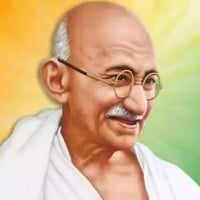 Mahatma Gandhi, born in 1869, was an Indian lawyer, anti-colonial nationalist, and spiritual leader. Through his philosophy of nonviolent resistance, Gandhi led the Indian independence movement against British rule. His peaceful protests, civil disobedience campaigns, and unwavering commitment to truth and justice made him an icon of nonviolence and inspired similar movements globally. Gandhi's profound impact on the world, advocating for equality and freedom, earned him the reverence of millions and his place as one of history's most influential figures. His principles of nonviolence and peaceful resistance continue to inspire social and political change.
Mahatma Gandhi, born in 1869, was an Indian lawyer, anti-colonial nationalist, and spiritual leader. Through his philosophy of nonviolent resistance, Gandhi led the Indian independence movement against British rule. His peaceful protests, civil disobedience campaigns, and unwavering commitment to truth and justice made him an icon of nonviolence and inspired similar movements globally. Gandhi's profound impact on the world, advocating for equality and freedom, earned him the reverence of millions and his place as one of history's most influential figures. His principles of nonviolence and peaceful resistance continue to inspire social and political change.
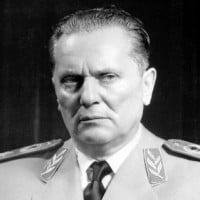 Josip Broz Tito, born in 1892, was a Yugoslav revolutionary and statesman. He led the Partisan resistance against Nazi occupation during World War II, and his leadership later established the Socialist Federal Republic of Yugoslavia. Tito's ability to navigate complex political landscapes and foster unity among diverse ethnic groups made him a symbol of resistance and a revered figure in Yugoslavia and beyond. His non-aligned foreign policy and advocacy for workers' rights left a lasting impact on the global stage. Tito's legacy as a revolutionary leader and statesman continues to inspire movements for independence and social justice.
Josip Broz Tito, born in 1892, was a Yugoslav revolutionary and statesman. He led the Partisan resistance against Nazi occupation during World War II, and his leadership later established the Socialist Federal Republic of Yugoslavia. Tito's ability to navigate complex political landscapes and foster unity among diverse ethnic groups made him a symbol of resistance and a revered figure in Yugoslavia and beyond. His non-aligned foreign policy and advocacy for workers' rights left a lasting impact on the global stage. Tito's legacy as a revolutionary leader and statesman continues to inspire movements for independence and social justice. He managed single handed to defeat Germans, Italian and Croatian nazis and Serbian kings army. Hitler said if he had 5 generals like Tito was that he would rule the World. Later he refused USA and Russia offers to join them and if they persist he will fight them as well. USA and Russia never dared to invade country of 10 million people at that time.
 Nelson Mandela, born in 1918, was a South African anti-apartheid revolutionary and politician who served as the first black President of South Africa from 1994 to 1999. Mandela dedicated his life to fighting against racial segregation and inequality under the apartheid regime. After spending 27 years in prison, he emerged as a symbol of resistance and reconciliation, advocating for peaceful transition and national unity. Mandela's leadership and unwavering commitment to justice and equality earned him global admiration and the Nobel Peace Prize. His legacy as a revolutionary and peacemaker continues to inspire movements for social justice and human rights.
Nelson Mandela, born in 1918, was a South African anti-apartheid revolutionary and politician who served as the first black President of South Africa from 1994 to 1999. Mandela dedicated his life to fighting against racial segregation and inequality under the apartheid regime. After spending 27 years in prison, he emerged as a symbol of resistance and reconciliation, advocating for peaceful transition and national unity. Mandela's leadership and unwavering commitment to justice and equality earned him global admiration and the Nobel Peace Prize. His legacy as a revolutionary and peacemaker continues to inspire movements for social justice and human rights. He's surely the greatest of our lifetimes.
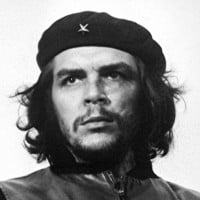 Che Guevara, born in 1928, was an Argentine Marxist revolutionary and a key figure in the Cuban Revolution. Known for his iconic image and unwavering dedication to the cause, Guevara fought alongside Fidel Castro to overthrow the oppressive regime of Fulgencio Batista. He became a symbol of rebellion and anti-imperialism, advocating for worldwide revolution and social equality. Guevara's radical ideas, fiery speeches, and commitment to armed struggle left an indelible mark on revolutionary movements across the globe. Despite his controversial methods, Che Guevara remains an enduring symbol of resistance and the fight against injustice.
Che Guevara, born in 1928, was an Argentine Marxist revolutionary and a key figure in the Cuban Revolution. Known for his iconic image and unwavering dedication to the cause, Guevara fought alongside Fidel Castro to overthrow the oppressive regime of Fulgencio Batista. He became a symbol of rebellion and anti-imperialism, advocating for worldwide revolution and social equality. Guevara's radical ideas, fiery speeches, and commitment to armed struggle left an indelible mark on revolutionary movements across the globe. Despite his controversial methods, Che Guevara remains an enduring symbol of resistance and the fight against injustice. A pretty damn ballsy revolutionary, since he was going up against the Peronist party
A lso, a badass, because here are his last words before he died
"I know you are here to kill me. Shoot, you are only going to kill a man" basically saying that you may have killed me, but the things iv'e done will never die
A quote referring to Che
"Che's life is an inspiration for every human being who loves freedom. We will always honor his memory"
Who said that, you ask?
Nelson Mandela
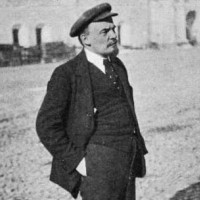 Vladimir Lenin, born in 1870, was a Russian revolutionary, political theorist, and the first leader of the Soviet Union. As the architect of the October Revolution in 1917, Lenin played a pivotal role in overthrowing the Russian monarchy and establishing a socialist state. His ideologies, encapsulated in the concept of Leninism, advocated for the rights of workers and the dismantling of oppressive class systems. Lenin's leadership laid the foundation for the Soviet Union, shaping the course of 20th-century history. His contributions to revolutionary theory and socialist principles continue to resonate with activists and thinkers worldwide.
Vladimir Lenin, born in 1870, was a Russian revolutionary, political theorist, and the first leader of the Soviet Union. As the architect of the October Revolution in 1917, Lenin played a pivotal role in overthrowing the Russian monarchy and establishing a socialist state. His ideologies, encapsulated in the concept of Leninism, advocated for the rights of workers and the dismantling of oppressive class systems. Lenin's leadership laid the foundation for the Soviet Union, shaping the course of 20th-century history. His contributions to revolutionary theory and socialist principles continue to resonate with activists and thinkers worldwide. Oh, yeah.
Kicked-off a reign of terror that began in the early 20th century, and hasn't ended yet.
He did do quite a lot for Russia, but here's the major flaw.
He hired Stalin, and named him as his replacement
 Dr. B.R Ambedkar, born in 1891, was an Indian jurist, economist, and social reformer who played a pivotal role in the fight against caste discrimination in India. As the chief architect of the Indian Constitution, Ambedkar championed the rights of marginalized communities, particularly the Dalits, advocating for equality and social justice. His lifelong struggle against social inequality and untouchability made him a revered figure and the voice of the oppressed. Ambedkar's legacy as a revolutionary and social reformer continues to inspire movements for equality and upliftment of marginalized communities in India.
Dr. B.R Ambedkar, born in 1891, was an Indian jurist, economist, and social reformer who played a pivotal role in the fight against caste discrimination in India. As the chief architect of the Indian Constitution, Ambedkar championed the rights of marginalized communities, particularly the Dalits, advocating for equality and social justice. His lifelong struggle against social inequality and untouchability made him a revered figure and the voice of the oppressed. Ambedkar's legacy as a revolutionary and social reformer continues to inspire movements for equality and upliftment of marginalized communities in India. Greatest off all time for humanity and equality and human values
 Fidel Castro, born in 1926, was a Cuban revolutionary and politician who played a central role in the Cuban Revolution. Together with Che Guevara, Castro led an armed rebellion against the oppressive regime of Fulgencio Batista, eventually establishing a socialist state in Cuba. His charismatic leadership, socialist policies, and defiance against the United States made him a symbol of resistance and anti-imperialism. Castro's legacy as a revolutionary leader and his impact on the geopolitics of the Cold War era continue to shape the history and identity of Cuba.
Fidel Castro, born in 1926, was a Cuban revolutionary and politician who played a central role in the Cuban Revolution. Together with Che Guevara, Castro led an armed rebellion against the oppressive regime of Fulgencio Batista, eventually establishing a socialist state in Cuba. His charismatic leadership, socialist policies, and defiance against the United States made him a symbol of resistance and anti-imperialism. Castro's legacy as a revolutionary leader and his impact on the geopolitics of the Cold War era continue to shape the history and identity of Cuba. He took down Batista who was a mass murderer. He was a man who promoted liberty and did so for his people. As some of us already know, Anti-communist propaganda ruined his image for some people.
List of good things he's done:
- Took down Batista and exiled him. Notice how Fidel's arch nemesis was exiled, not brutally tortured nor murdered. Do you still believe that he tortured his own people to death when he spared his own enemy?
- Set up a communist government for the benefit of the Cuban people. What counted was the intention. He did so because he thought that communism can restore balance between everyone living within Cuba. Although it came with its disadvantages such as strict control over businesses, it gave the country an amazing health system, a reduction of illiteracy, and went against racism.
- He defended his country from the USA. In 1961, under the order of JFK, the Bay of Pigs Invasion was set into motion. Fidel became communist and that's the only reason US assisted Cuban rebels in the invasion. Fidel was a leader of a small country and the only solution he had to defend his nation was to approach the Soviet Union. He established missile bases in Cuba because he knew the US wouldn't dare invade Cuba when it had weapons of mass destruction. One can criticize the US who should have never created nuclear devices and even disposed of them after learning about the horrors of Hiroshima and Nagasaki. If the blueprints for nukes were burnt, the Soviets wouldn't have stolen them and the Cuban Missile Crisis would have never occurred. Fidel had no blame in this matter. He did it for the protection of him and his people.
Then why did people hate him?
- Whether a leader is good or bad for the country, he/she will always be hated by a number of people. Now when the US hates you, it's a completely different story. You'd be antagonized and have your own people turned against you. US wasn't so fond of communism and it used its... more
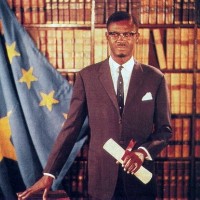 Patrice Lumumba, born in 1925, was a Congolese independence leader and the first Prime Minister of the Democratic Republic of the Congo. Lumumba played a pivotal role in the struggle for independence from Belgian colonial rule. His passionate speeches and calls for unity and self-determination inspired the Congolese people. However, Lumumba's time in power was short-lived, as political turmoil and external interference led to his overthrow and tragic assassination in 1961. Lumumba's legacy as a revolutionary and martyr remains a symbol of African independence and the fight against colonialism.
Patrice Lumumba, born in 1925, was a Congolese independence leader and the first Prime Minister of the Democratic Republic of the Congo. Lumumba played a pivotal role in the struggle for independence from Belgian colonial rule. His passionate speeches and calls for unity and self-determination inspired the Congolese people. However, Lumumba's time in power was short-lived, as political turmoil and external interference led to his overthrow and tragic assassination in 1961. Lumumba's legacy as a revolutionary and martyr remains a symbol of African independence and the fight against colonialism.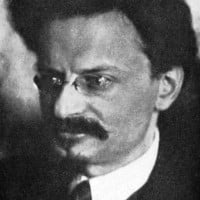 Leon Trotsky, born in 1879, was a Russian revolutionary and a key figure in the early days of the Soviet Union. Alongside Lenin, Trotsky played a crucial role in the success of the October Revolution. He was instrumental in establishing and leading the Red Army during the Russian Civil War. Trotsky was a passionate advocate for permanent revolution and international socialism. However, his falling out with Stalin led to his exile and eventual assassination in 1940. Despite his ultimate political defeat, Trotsky's ideas and contributions to revolutionary theory continue to be studied and debated by scholars and activists worldwide.
Leon Trotsky, born in 1879, was a Russian revolutionary and a key figure in the early days of the Soviet Union. Alongside Lenin, Trotsky played a crucial role in the success of the October Revolution. He was instrumental in establishing and leading the Red Army during the Russian Civil War. Trotsky was a passionate advocate for permanent revolution and international socialism. However, his falling out with Stalin led to his exile and eventual assassination in 1940. Despite his ultimate political defeat, Trotsky's ideas and contributions to revolutionary theory continue to be studied and debated by scholars and activists worldwide.
 Mao Zedong, born in 1893, was a Chinese revolutionary and the founding father of the People's Republic of China. As the leader of the Communist Party of China, Mao led the Chinese Communist Revolution, overthrowing the Nationalist government and establishing a communist state. His ideologies, outlined in Maoism, emphasized rural revolution and class struggle. Mao's policies and campaigns, such as the Great Leap Forward and the Cultural Revolution, had far-reaching effects on Chinese society and politics. Mao's legacy as a revolutionary leader and his impact on modern Chinese history remain subjects of debate and analysis.
Mao Zedong, born in 1893, was a Chinese revolutionary and the founding father of the People's Republic of China. As the leader of the Communist Party of China, Mao led the Chinese Communist Revolution, overthrowing the Nationalist government and establishing a communist state. His ideologies, outlined in Maoism, emphasized rural revolution and class struggle. Mao's policies and campaigns, such as the Great Leap Forward and the Cultural Revolution, had far-reaching effects on Chinese society and politics. Mao's legacy as a revolutionary leader and his impact on modern Chinese history remain subjects of debate and analysis. Those estimations are according to anticommunist propaganda.First official census in China was done in 1975.
Murdered 60 million of his own people.
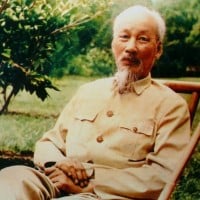 Ho Chi Minh, born in 1890, was a Vietnamese revolutionary and the founding father of the Democratic Republic of Vietnam. As the leader of the Viet Minh and the North Vietnamese government, Ho Chi Minh led the resistance against French colonization and later against the United States during the Vietnam War. His unwavering determination and guerilla warfare tactics made him a symbol of resistance and the face of Vietnamese nationalism. Ho Chi Minh's leadership and vision continue to shape Vietnam's history and inspire movements for independence and self-determination.
Ho Chi Minh, born in 1890, was a Vietnamese revolutionary and the founding father of the Democratic Republic of Vietnam. As the leader of the Viet Minh and the North Vietnamese government, Ho Chi Minh led the resistance against French colonization and later against the United States during the Vietnam War. His unwavering determination and guerilla warfare tactics made him a symbol of resistance and the face of Vietnamese nationalism. Ho Chi Minh's leadership and vision continue to shape Vietnam's history and inspire movements for independence and self-determination.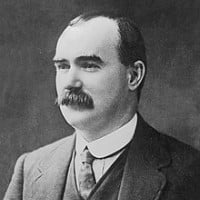 James Connolly, born in 1868, was an Irish socialist revolutionary and a key leader in the Easter Rising of 1916. Connolly, along with other rebels, sought to establish an independent Irish Republic and end British rule. His steadfast commitment to workers' rights, Irish nationalism, and the pursuit of social justice made him a beloved figure among Irish republicans. Despite his execution following the failed uprising, Connolly's legacy as a revolutionary socialist and his impact on the fight for Irish independence remain deeply influential in Irish history and politics.
James Connolly, born in 1868, was an Irish socialist revolutionary and a key leader in the Easter Rising of 1916. Connolly, along with other rebels, sought to establish an independent Irish Republic and end British rule. His steadfast commitment to workers' rights, Irish nationalism, and the pursuit of social justice made him a beloved figure among Irish republicans. Despite his execution following the failed uprising, Connolly's legacy as a revolutionary socialist and his impact on the fight for Irish independence remain deeply influential in Irish history and politics.
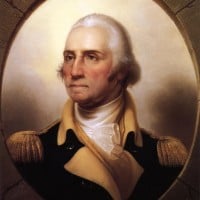 George Washington, born in 1732, was an American revolutionary leader and the first President of the United States. As the commander-in-chief of the Continental Army during the American Revolutionary War, Washington played a pivotal role in leading the colonies to victory against British rule. His leadership and steadfast determination to secure independence for the United States established him as a revered figure in American history. Washington's willingness to relinquish power after his presidency set a precedent for the peaceful transfer of power and solidified his status as one of the founding fathers of the nation. His legacy as a revolutionary and statesman continues to inspire generations.
George Washington, born in 1732, was an American revolutionary leader and the first President of the United States. As the commander-in-chief of the Continental Army during the American Revolutionary War, Washington played a pivotal role in leading the colonies to victory against British rule. His leadership and steadfast determination to secure independence for the United States established him as a revered figure in American history. Washington's willingness to relinquish power after his presidency set a precedent for the peaceful transfer of power and solidified his status as one of the founding fathers of the nation. His legacy as a revolutionary and statesman continues to inspire generations.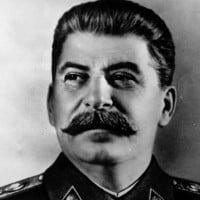 Joseph Stalin, born in 1878, was a Soviet politician and the leader of the Soviet Union from the mid-1920s until his death in 1953. After Lenin's death, Stalin rose to power and implemented a series of economic and social policies that transformed the Soviet Union into a major world power. However, his rule was marked by widespread purges, forced collectivization, and political repression, leading to the suffering and deaths of millions. Stalin's authoritarian leadership and brutal regime left a controversial and lasting impact on the course of Soviet history and the global political landscape.
Joseph Stalin, born in 1878, was a Soviet politician and the leader of the Soviet Union from the mid-1920s until his death in 1953. After Lenin's death, Stalin rose to power and implemented a series of economic and social policies that transformed the Soviet Union into a major world power. However, his rule was marked by widespread purges, forced collectivization, and political repression, leading to the suffering and deaths of millions. Stalin's authoritarian leadership and brutal regime left a controversial and lasting impact on the course of Soviet history and the global political landscape.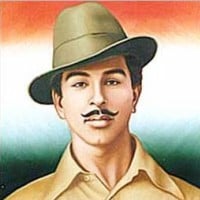 Bhagat Singh, born in 1907, was an Indian revolutionary and a prominent figure in the Indian independence movement against British colonial rule. Known for his fearlessness and fiery nationalism, Singh advocated for armed resistance and played a significant role in several acts of revolutionary violence against the British government. Despite his young age, Singh's martyrdom at the hands of the British authorities in 1931 left an indelible mark on the fight for independence and inspired generations of Indians in their struggle for freedom. Singh's sacrifice and unwavering commitment to the cause continue to be celebrated as a symbol of resistance and patriotism.
Bhagat Singh, born in 1907, was an Indian revolutionary and a prominent figure in the Indian independence movement against British colonial rule. Known for his fearlessness and fiery nationalism, Singh advocated for armed resistance and played a significant role in several acts of revolutionary violence against the British government. Despite his young age, Singh's martyrdom at the hands of the British authorities in 1931 left an indelible mark on the fight for independence and inspired generations of Indians in their struggle for freedom. Singh's sacrifice and unwavering commitment to the cause continue to be celebrated as a symbol of resistance and patriotism. He is a great freedom fighter who sacrificed his life. Hats off to Bhagat Singh
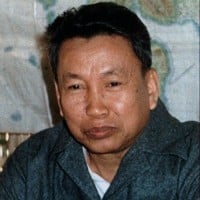 Pol Pot, born in 1925, was a Cambodian revolutionary and the leader of the Khmer Rouge regime. As the Prime Minister of Democratic Kampuchea, Pol Pot implemented radical policies that aimed to create an agrarian communist society, resulting in widespread forced labor, mass executions, and the infamous Cambodian genocide. His brutal regime caused the deaths of millions of Cambodians and left a devastating impact on the country. Pol Pot's reign of terror stands as a chilling reminder of the atrocities committed in the name of revolution, leaving behind a legacy of horror and suffering.
Pol Pot, born in 1925, was a Cambodian revolutionary and the leader of the Khmer Rouge regime. As the Prime Minister of Democratic Kampuchea, Pol Pot implemented radical policies that aimed to create an agrarian communist society, resulting in widespread forced labor, mass executions, and the infamous Cambodian genocide. His brutal regime caused the deaths of millions of Cambodians and left a devastating impact on the country. Pol Pot's reign of terror stands as a chilling reminder of the atrocities committed in the name of revolution, leaving behind a legacy of horror and suffering.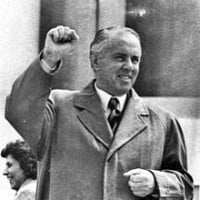 Enver Hoxha, born in 1908, was an Albanian communist politician and the leader of Albania from 1944 until his death in 1985. Hoxha's rule was characterized by an isolationist and oppressive regime, marked by purges, political repression, and the complete severance of ties with the outside world. His rigid implementation of Stalinist principles led to the stifling of political dissent and the suppression of basic freedoms. Hoxha's authoritarian leadership left Albania in a state of deep isolation and underdeveloped for decades. His legacy remains highly controversial, representing the extreme measures taken in the pursuit of a communist vision.
Enver Hoxha, born in 1908, was an Albanian communist politician and the leader of Albania from 1944 until his death in 1985. Hoxha's rule was characterized by an isolationist and oppressive regime, marked by purges, political repression, and the complete severance of ties with the outside world. His rigid implementation of Stalinist principles led to the stifling of political dissent and the suppression of basic freedoms. Hoxha's authoritarian leadership left Albania in a state of deep isolation and underdeveloped for decades. His legacy remains highly controversial, representing the extreme measures taken in the pursuit of a communist vision. He was one of a few really great communist leaders of the 20th century.
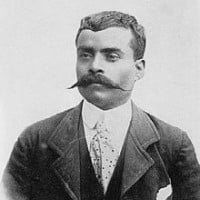 Emiliano Zapata, born in 1879, was a Mexican revolutionary leader and a key figure in the Mexican Revolution. Zapata was a champion of agrarian reform and the rights of peasants and indigenous communities. He led the Liberation Army of the South, advocating for land redistribution and social justice. Zapata's slogan, "Tierra y Libertad" (Land and Liberty), symbolized his commitment to the landless farmers and his fight against the oppressive regime of Porfirio Díaz. Zapata's revolutionary spirit and his enduring legacy as a defender of the marginalized continue to inspire movements for social and economic equality in Mexico.
Emiliano Zapata, born in 1879, was a Mexican revolutionary leader and a key figure in the Mexican Revolution. Zapata was a champion of agrarian reform and the rights of peasants and indigenous communities. He led the Liberation Army of the South, advocating for land redistribution and social justice. Zapata's slogan, "Tierra y Libertad" (Land and Liberty), symbolized his commitment to the landless farmers and his fight against the oppressive regime of Porfirio Díaz. Zapata's revolutionary spirit and his enduring legacy as a defender of the marginalized continue to inspire movements for social and economic equality in Mexico.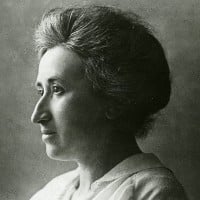 Rosa Luxemburg, born in 1871, was a Polish-German Marxist revolutionary and political theorist. Luxemburg was a prominent figure in the German and international socialist movements, advocating for social and economic justice. Her critiques of capitalism, imperialism, and militarism resonated with many, and she actively fought for workers' rights and the establishment of a socialist society. Luxemburg's unwavering commitment to revolutionary ideals, her intellectual contributions, and her fearless pursuit of justice made her a highly influential figure in socialist and feminist thought. Luxemburg's legacy as a revolutionary thinker continues to inspire and challenge scholars and activists alike.
Rosa Luxemburg, born in 1871, was a Polish-German Marxist revolutionary and political theorist. Luxemburg was a prominent figure in the German and international socialist movements, advocating for social and economic justice. Her critiques of capitalism, imperialism, and militarism resonated with many, and she actively fought for workers' rights and the establishment of a socialist society. Luxemburg's unwavering commitment to revolutionary ideals, her intellectual contributions, and her fearless pursuit of justice made her a highly influential figure in socialist and feminist thought. Luxemburg's legacy as a revolutionary thinker continues to inspire and challenge scholars and activists alike.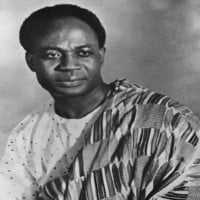 Kwame Nkrumah, born in 1909, was a Ghanaian nationalist and politician who led the Gold Coast to independence from British colonial rule in 1957. Nkrumah became the first Prime Minister and later the President of Ghana. He was a champion of pan-Africanism and advocated for the unity and liberation of African nations. Nkrumah's leadership and his vision for a united and prosperous Africa made him a prominent figure in the decolonization movement and an inspiration for independence movements across the continent. His legacy as a revolutionary leader and his contributions to African unity continue to shape the narrative of African history and inspire future generations.
Kwame Nkrumah, born in 1909, was a Ghanaian nationalist and politician who led the Gold Coast to independence from British colonial rule in 1957. Nkrumah became the first Prime Minister and later the President of Ghana. He was a champion of pan-Africanism and advocated for the unity and liberation of African nations. Nkrumah's leadership and his vision for a united and prosperous Africa made him a prominent figure in the decolonization movement and an inspiration for independence movements across the continent. His legacy as a revolutionary leader and his contributions to African unity continue to shape the narrative of African history and inspire future generations.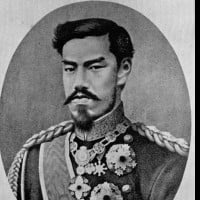 Emperor Meiji, born in 1852, was a Japanese monarch and a pivotal figure in Japan's Meiji Restoration. His ascension to the throne marked the end of the feudal era and the beginning of Japan's rapid modernization and Westernization. Under his leadership, Japan underwent significant political, social, and economic reforms, propelling it into becoming a major world power. Emperor Meiji's vision and determination to modernize Japan laid the foundation for its transformation into a modern nation-state and set the stage for its future success on the global stage.
Emperor Meiji, born in 1852, was a Japanese monarch and a pivotal figure in Japan's Meiji Restoration. His ascension to the throne marked the end of the feudal era and the beginning of Japan's rapid modernization and Westernization. Under his leadership, Japan underwent significant political, social, and economic reforms, propelling it into becoming a major world power. Emperor Meiji's vision and determination to modernize Japan laid the foundation for its transformation into a modern nation-state and set the stage for its future success on the global stage. Crazy Horse, born around 1840, was a legendary Lakota Sioux warrior and a key figure in the resistance against the encroachment of Native American lands by the United States government. Known for his exceptional military skills and unwavering commitment to protecting his people's way of life, Crazy Horse played a crucial role in the Great Sioux War and the Battle of Little Bighorn. His fierce resistance against the U.S. Army became a symbol of Native American resilience and the fight for indigenous rights and autonomy. Crazy Horse's legacy as a warrior and symbol of Native American resistance endures as a testament to the ongoing struggles faced by indigenous communities.
Crazy Horse, born around 1840, was a legendary Lakota Sioux warrior and a key figure in the resistance against the encroachment of Native American lands by the United States government. Known for his exceptional military skills and unwavering commitment to protecting his people's way of life, Crazy Horse played a crucial role in the Great Sioux War and the Battle of Little Bighorn. His fierce resistance against the U.S. Army became a symbol of Native American resilience and the fight for indigenous rights and autonomy. Crazy Horse's legacy as a warrior and symbol of Native American resistance endures as a testament to the ongoing struggles faced by indigenous communities.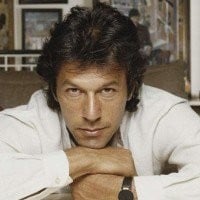 Imran Khan, born in 1952, is a Pakistani politician, former cricketer, and the current Prime Minister of Pakistan. Khan's rise to power was propelled by his charismatic leadership and the founding of the Pakistan Tehreek-e-Insaf (PTI) political party. As a politician, Khan has advocated for social justice, anti-corruption measures, and the improvement of Pakistan's governance. His ascent to the highest political office in Pakistan marked a significant shift in the country's political landscape and inspired hopes for change and progress. Khan's leadership and vision for a better Pakistan continue to shape the country's trajectory.
Imran Khan, born in 1952, is a Pakistani politician, former cricketer, and the current Prime Minister of Pakistan. Khan's rise to power was propelled by his charismatic leadership and the founding of the Pakistan Tehreek-e-Insaf (PTI) political party. As a politician, Khan has advocated for social justice, anti-corruption measures, and the improvement of Pakistan's governance. His ascent to the highest political office in Pakistan marked a significant shift in the country's political landscape and inspired hopes for change and progress. Khan's leadership and vision for a better Pakistan continue to shape the country's trajectory.